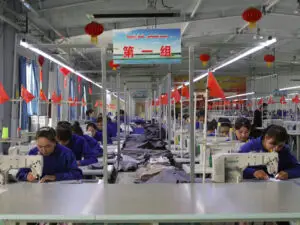From our deep roots as a nascent country to striking workers today at core companies, there are few things more uniquely American than worker’s rights.
Today’s labor movement doesn’t look entirely different in scope than its origin stories. Nearly 300 years ago – before Dolores Huerta and Cesar Chavez, before the United Auto Workers and the Triangle Shirtwaist fire, even before the Declaration of Independence – there was the 1741 Baker’s Strike, generally accepted as this nation’s first strike. A band of bread makers, incensed at the prices of wheat foisted upon them, organized the first work stoppage in America [source, source], cementing a rich American tradition of labor rights.
As the United States began to cement itself on the global stage, labor activists, born of a system that offered great economic opportunity amidst trying conditions, organized the first Labor Day in 1882. Congress in 1894 made Labor Day a federal holiday, recognizing the contributions of workers to America’s prosperity and strength.
As Americans, we pride ourselves on exceptionalism. If we are to actually be a shining light on a hill, let us export one of our greatest national blueprints: free and fair labor rights to parts of the world where forced labor is too often the norm.
On this Labor Day, workers at Amazon, Starbucks and even adult-only dance clubs are all in various stages of organizing in the same vein as the NYC bakers 241 years ago. Thankfully, they have a right to protest.
That is not the case in China, where more than 1 million Uyghurs, a persecuted and ethnically Turkic Muslim minority, are detained in “reeducation camps,” making products Americans use on a daily basis. The United Nations recently said Uyghurs endure a modern form of slavery, which China denies.
The U.N. report cited a reality in which Uyghurs endure “excessive surveillance, abusive living and working conditions, restriction of movement through internment, threats, physical and/or sexual violence and other inhuman or degrading treatment.” [source]
In many respects, America has been an outspoken leader on the charge for Uyghur rights. Last year, President Biden signed into law the Uyghur Forced Labor Prevention Act, which aims to prohibit anything made with forced labor in Xinjiang from entering U.S. markets. The State Department in 2021 declared that the Chinese government is, in fact, committing genocide and that “we are witnessing the systematic attempt to destroy Uyghurs by the Chinese party-state.” [source]
International organizations, including ours, welcome these measures. But there is more that consumers can do to use their purchasing power to demand that companies ethically source their products. Consumers can ensure they are on the right side of history by using the Uyghur Forced Labor Database to track over 800 companies linked to Uyghur slave labor and use their purchase power accordingly.
Today, many of us will gather around barbecues or relax in our homes stocked with goods from a globalized marketplace. This is a day to recognize the achievements of American workers, whose ingenuity builds engines that make the world run. What better way to celebrate America’s workers than to export our belief in our rights?
On this Labor Day, as we enjoy a day off, let us speak up for those forced to work. If we take our freedom seriously and our ability to buy what we want from where we want, then we must export the most classic of American values: labor rights.
Let us make Labor Day not just a day off of work for Americans. Let us also recognize the plight of the Uyghurs and millions of others enslaved by governments worldwide.


